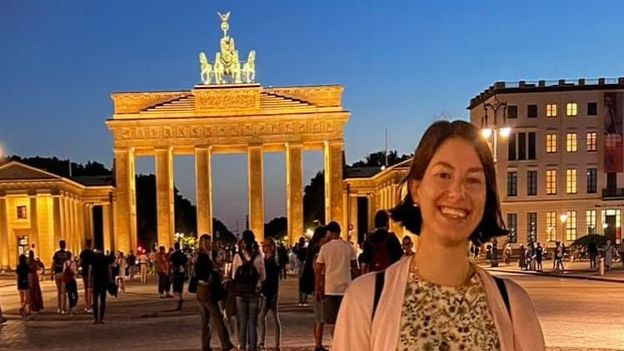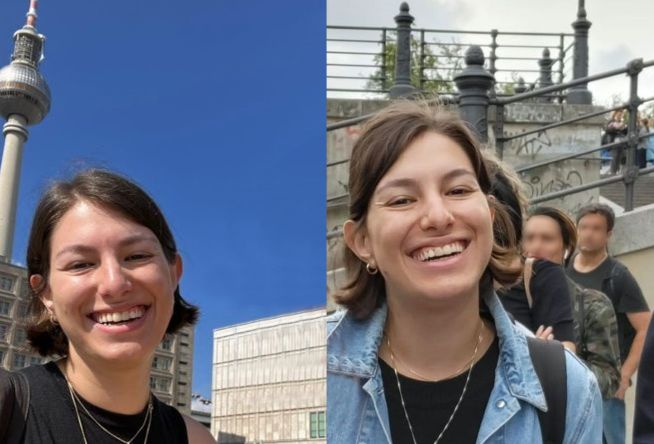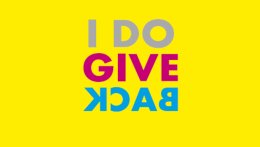Naomi Marberg
 Privat
Privat
Naomi Marberg in front of the Brandenburg Gate in Berlin
"I would like to thank the DAAD-Stiftung and Dr. Gustav Winkler for giving me the opportunity to spend time in such an interesting and unique city, and to boost my German skills, which I have worked very hard to gain over the past several years.
By being in Berlin thanks to the scholarship, I could have conversations in German with fellow students with whom I had no common language, and of course I was able
to practice the language during everyday life in the city. I look forward to improving
my skills further and leveraging this in my career as stage designer."
Thanks to a Dr. Gustav Winkler scholarship of the DAAD-Stiftung, Naomi Marberg was able to attend a German course in Berlin and spend a month exploring the capital city.
In the following, she reports on her experiences on site:
I attended the summer course at IIK Berlin, and had a great time with the new and wonderful people I met, and in the city itself.
At the beginning, I and about 20 more students stayed at “Hotel Müggelsee“ located near Köpenick (east Berlin). I got a single bedroom, and we had a kitchen, where we could cook meals for ourselves and get to know worldwide cuisine, alongside practicing German with other students who came from fascinating countries.
Our course took place at IIK, which is in Wedding, Berlin. Unfortunately, this was an hour and a half away from the accommodation. Yet, in less than a week, the IIK team understood this problematic situation, and we were all moved to “Humboldt Institut”, which was much closer to school. At the new accommodation there were no single rooms, so I joined in with a charming roommate from Turkey and we had a great partnership.
On the first day of school, I was placed in a class at C1 level, although according to the test that I had taken before the beginning of the course, clearly this was too high a level for me. At the end of that day, the teacher was kind enough to help me change class to a level that was more appropriate for me. That is how I got to a B1.2 level class, where I could challenge myself, along with repeating what I already knew.
The lessons were hybrid – partly in class, and partly via Zoom. This was convenient, because some students could join the lessons even though they were not in Berlin. In the classroom itself we were 15 students, and 3 students were connected online. The program was diverse and included teaching methods that could help each and every one make progress and improve their weak points. We had two teachers with slightly different approaches, which added to the challenge and diversity of the course. I completed the course with an adequate grade, and I was very pleased with my progress.
We had time to wander in the city and help each other with homework. We have gathered a small group of students, which included people from Turkey, Thailand, Romania and more, and we had a daily routine that left everyone time to do their own program, and yet an option to tour together the local environment and not be left alone. On Sundays we enjoyed going to the Flohmarkt (flee market), and we were lucky enough also to be in the city during “Lange Nacht der Museen“, where all the museums were open all night long. We visited many museums together and saw the city then in a different light. I enjoyed going to the DDR Museum as they have a designed model of an apartment in east Berlin, and you can really sense the lifestyle that was acceptable back then, by color, furniture and textile.

Privat
Exploring the city of Berlin
Berlin is a city that combines many cultures, and our student group was very interested in that aspect. I enjoyed sharing my customs with the other students. For example, in my home country Israel, Friday dinner is usually a family gathering, or an evening with close friends. I tried to introduce the group to this unique experience. So, on Friday evenings we went out for a nice dinner which we could all enjoy. There, we shared stories from home, and learnt about each other’s different traditions. Furthermore, together we discovered similarities between our cultures. It happened to be that despite our different backgrounds, we were able to create a small community that could contain all of us, and not let us feel like strangers in the city.
Everyday life in Germany is not much different from that in Israel, once you understand the social norms. One of the things that amazed me the most was the approach toward the climate crisis. In Germany, there are a lot of incentives in that respect, such as a high deposit on plastic bottles, efficient public transportation, and a good system for bicycles, too. It felt easier to help our environment while in Berlin because there is more social awareness, for example using paper bags in supermarkets instead of plastic ones, or no plastic straws in restaurants, nor plastic boxes. It made me more conscious and showed me that even in a large city with different people with diverse customs, it is possible to make a collective change, even if it is a small one.
Overall, I have learned that Berlin is a city which is very welcoming for all cultures, and everyone is accepted in society and has a valid space. However, there are always reminders of where you are, and the history around you. In Hebrew there is a saying that I think is appropriate for Berlin, and tells so much about its history and the wonderful and multi-cultural people in it – “A nation that does not respect its past will have a dull present and an uncertain future“ (by Yigal Alon, a former Israeli politician).
As of February 2023.


